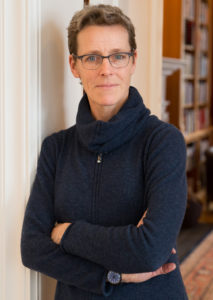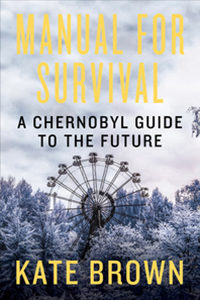Kate Brown’s research interests illuminate the point where history, science, technology and bio-politics converge to create large-scale disasters and modernist wastelands. She has written four books about topics ranging from population politics, linguistic mapping, the production of nuclear weapons and concomitant utopian communities, the health and environmental consequences of nuclear fallout from the Chernobyl disaster to narrative innovations of history writing in the 21st century. She is currently heading in a new direction, working on a manuscript called “Tiny Gardens Everywhere: The History of the Self-Provisioning City.” This history follows plants and people who tended them through 20th-century urban history. How essential were welfare landscapes to sustain increasingly unsustainable urban conglomerations in Europe and North America? Urban gardeners in the long 20th century accomplished many of the goals of food sustainability reformers today. They produced local, diverse, organic food on marginal land with short market chains and few post-harvest food losses. Growers recycled the wealth of nutrients generated in urban households and remediated contaminated earth, which in turn disrupted the metabolic rift that impoverished soils and fueled colonization elsewhere. Gardeners’ technologies produced economies, ecologies, and nutrients that engineered humans to be at the center of their environments, adapted to it, belonging.
Brown teaches environmental history, the history of food production, the history of plants and people, wild and cultivated, and a seminar on narrating the Anthropocene. Her graduate seminars focus on exploring creative non-fiction narrative modes.
Brown’s books have won numerous prizes. A Biography of No Place: From Ethnic Borderland to Soviet Heartland (Harvard 2004) won the American Historical Association’s George Louis Beer Prize for the Best Book in International European History. Plutopia: Nuclear Families in Atomic Cities and the Great Soviet and American Plutonium Disasters (Oxford 2013) was awarded the American Historical Association’s Albert J. Beveridge and John H. Dunning Prizes for the best book in American history, the George Perkins Marsh Prize from the American Society for Environmental History, the Ellis W. Hawley Prize from the Organization of American Historians (OAH), the Wayne S. Vucinich Book Prize of the Association for Slavic Studies, East European, and Eurasian Studies, and the Robert G. Athearn Prize from the Western History Association. Brown was awarded the Heldt Prize from the Association for Women in Slavic Studies for both books. Dispatches from Dystopia: Histories of Places Not Yet Forgotten (University of Chicago Press 2015) was selected for Atlantic Monthly’s “Best Books We Read in 2016” list. In 2015, Brown was the recipient of the University of Maryland Regent’s Award for Excellence in Research. In 2017, Brown was awarded the Berlin Prize by the American Academy in Berlin. Her books have been translated into a variety of East European languages, Chinese, Japanese and French.
Manual for Survival was a finalist for the National Book Critics Circle Award, https://www.bookcritics.org/2020/02/23/manual-for-survival-by-kate-brown-2019-nonfiction-finalist/. And is also a finalist for the Ryszard Kapuscinski International Award for Literary Reporting, http://www.kulturalna.warszawa.pl/kapuscinski,4.html?locale=en_GB.
Brown has held fellowships from the Guggenheim Foundation, the Carnegie Foundation, the European University Institute, The Kennan Institute, Harvard’s Davis Center for Russian and Eurasian Studies, and the U.S. Holocaust Museum. The National Endowment for the Humanities, the American Council of Learned Societies, the International Research and Exchanges Board and the Social Science Research Foundation have supported Brown’s research.
Brown is a consulting editor for the American Historical Review (AHR) and co-founder of its special section called “History Unclassified.” She serves as a senior editor of International Labor and Working Class History (ILWCH).
Read articles from her latest project: 4/13/2020, The Pandemic is Not a Natural Disaster., The New Yorker, 4/13/2020. “Resurrecting the Soil,” Eurozine, and “The Little Gardens that Underwrote Soviet Globalism,” American Historical Review, June 2023.

